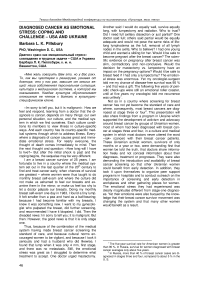Diagnosed cancer as emotional stress: coping and challenge - USA and Ukraine
Автор: Pillsbury Barbara L. K.
Журнал: Сибирский вестник психиатрии и наркологии @svpin
Рубрика: Тезисы докладов международной конференции по психоонкологии "Культура, мозг, тело"
Статья в выпуске: 3 (50), 2008 года.
Бесплатный доступ
«Мне жаль говорить Вам это, но у Вас рак». То, как мы чувствуем и реагируем, узнавая от доктора, что у нас рак, зависит от многих вещей: наша собственная персональная ситуация, культура и медицинская система, в которой мы оказываемся. Каждая культура обусловливает отношение ее членов к болезни в культурно-специфическом ключе.
Короткий адрес: https://sciup.org/142100752
IDR: 142100752
Текст статьи Diagnosed cancer as emotional stress: coping and challenge - USA and Ukraine
«Im sorry to tell you, but it is malignant». How we feel and respond, learning from a doctor that the diagnosis is cancer , depends on many things: our own personal situation, our culture, and the medical system in which we find ourselves. Each culture conditions its members to view illness in culture-specific ways. And each country has its country-specific medical systems through which to address illness. Everywhere a diagnosis of cancer causes great and immediate emotional stress. For nearly everyone, the thought of death comes immediately to mind. Then the next thought and question: «How long will I have to live?» But after the initial shock is past and the coping begins, the sequelae may be very different.
Thus, because of the combination of the medical system having made breast cancer screening the standard of care, and because cultural norms encouraged women to be vigilant, and because I took it seriously and had a husband who did likewise, I found that lump when it was only 4 mm, first stage, and there was no metastasis. Still, the emotional stress was great as I struggled to determine what treatment to accept. One doctor urged mastectomy.
Another said I would do equally well, survive equally long, with lumpectomy and radiation. Who to trust? Did I need full axillary dissection or just partial? One doctor said full; others said partial would be equally adequate and would not pose the same risks of lifelong lymphodema as the full, removal of all lymph nodes in the axilla. Who to believe? I had one young child and wanted a sibling for her. Would it be safe to become pregnant after the breast cancer? The scientific evidence on pregnancy after breast cancer was slim, contradictory and non-conclusive. Would the decision for mastectomy vs. lumpectomy have an impact on the pregnancy options? Would it be safe to breast feed if I had only a lumpectomy? The emotional stress was enormous. Yet my oncologist-surgeon told me my chance of disease-free survival was 95 % – and that was a gift. The following five years of periodic check-ups were still an emotional roller coaster, until at five years my oncologist told me recurrence was unlikely1.
Not so in a country where screening for breast cancer has not yet become the standard of care and where, consequently, most breast cancers are diagnosed at stage three or four2. This presentation will also share findings from a program in Ukraine which supported the development of activism and advocacy around breast cancer by groups of Ukrainian women, most of whom had been diagnosed with breast cancer at stages three and four, in a culture and medical system in which most doctors never uttered the word « rak » (cancer) with their breast cancer patients. These Ukrainian activist women, survivors of only months or a year or two, were demanding first that women be told the truth, that doctors share information freely and not conceal information about their diagnoses, treatment or prognoses. They were also demanding the introduction and availability of breast cancer screening so that other Ukrainian women could benefit from early detection. In addition, they took it upon themselves to organize peer support programs in hospitals and to conduct outreach on the importance of screening and early detection in workplaces and other gathering places for women. The emotional stress they had experienced was clearly magnitudes different from stage-one diagnoses. Yet their emotions were also buoyed by the knowledge that their breast cancer survivor movement was changing the system and that many other women would benefit as a result.


